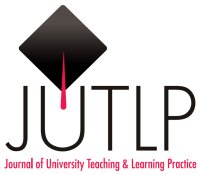| Yhteenveto: | Online learning has become more common since the COVID-19 pandemic, but limited research has examined factors affecting students' ability to transfer learning from online to the real world. This mixed-methods study explored the relationships between higher-order thinking skills, namely cognitive presence and self-regulation, and their roles in learning transfer in an online postgraduate medical sonography course in an Australian University. Performance data was evaluated for 53/54 students who allowed their online learning platform data, grades, and written contributions to learning tasks to be collected. Students also completed questionnaire measures of cognitive presence and online self-regulation, and seven students were interviewed about learning transfer. Cognitive presence and online self-regulation strategies were positively correlated. Interviews revealed that internal factors, such as cognitive presence and self-regulation, and external factors, such as supervisor support and workload, affected online learning transfer. Student performance indicated a high percentage of the Resolution phase of cognitive presence, which means near transfer. Our results suggest that cognitive presence and self-regulation can enhance students' ability to transfer learning within and beyond the course. Despite the complexities in online pedagogy, educators should create online content to foster cognitive presence and self-regulation to enhance students' ability to transfer learning to the real world. [Author abstract]
|
|---|


